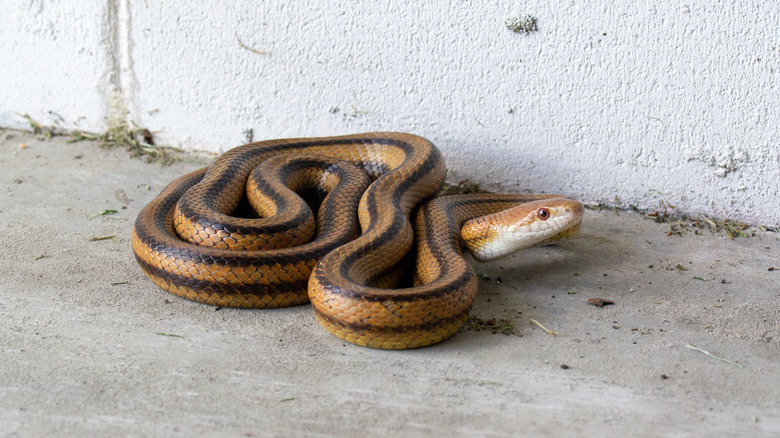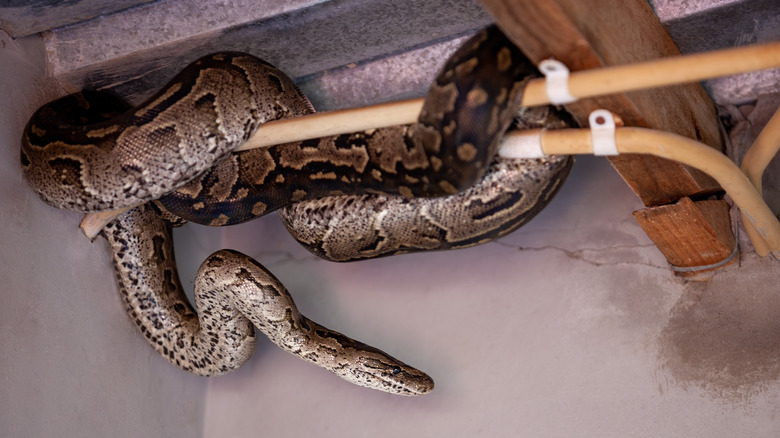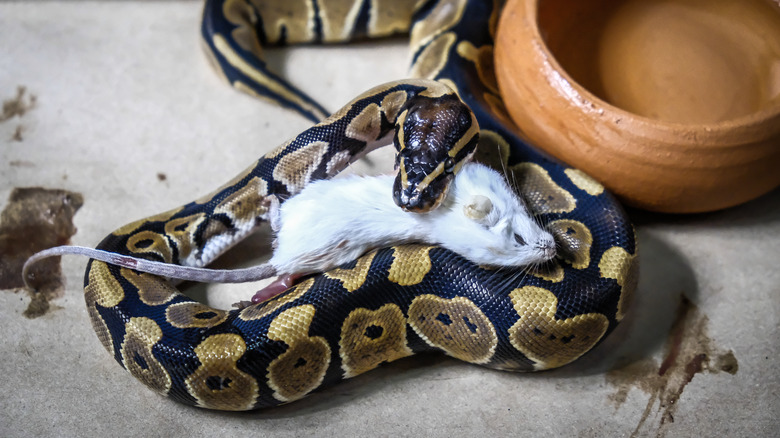Why You're More Likely To Find Snakes In Your Garage As Temperatures Drop
If you're someone who has a healthy fear of snakes, you're not alone. Almost half of Americans report that they have an anxious feeling about snakes, per a study in Psychiatry Res. Consequently, you may be looking for ways to keep snakes from slithering around in your yard. These methods are good to employ — as long as they don't drive these reptiles into your garage. Unfortunately, snakes are more likely to attempt to move into your garage during colder temperatures, as they seek warmth and a place to possibly make a nest until warmer weather returns. They also may enter your garage to seek out sources of food, including rodents, who are similarly likely to try to move into your home during colder weather.
Rats and mice are among the most common pests you'll find in your garage, and they're often looking for places to make nests in weather-protected areas that are hidden from people. They also like to use paper and cardboard as nesting materials, so if you have storage boxes in the area, they can draw rodents — as can the temptation of any bags of birdseed or animal food you may have in the garage. Aside from being pests on their own, rats and mice reproduce quickly, which can provide an ongoing food source for a snake that lives near a rodent nest. So if you have rodents moving into your garage, snakes may soon join them so they can be closer to a primary food source.
Why snakes are attracted to warm spaces like your garage
As temperatures fall going into late autumn and winter, snakes begin seeking warmer spaces to live. Like other reptiles, the snakes are cold-blooded — or ectothermic — animals, which means that they are reliant on the temperature of the external environment to attempt to control their internal temperature. Ectothermic animals can become too hot in the summertime, causing them to look for cooler environmental areas, just like they can become too cold in winter, causing them to look for warmth.
If you have warm spots in your garage, such as from a space heater, boiler, or hot water pipes, this can be a common place to find snakes. If these heat sources are in out-of-the-way places, such as in a corner where people rarely walk, the reptiles are even more drawn to them, as they often attempt to avoid human contact.
If you've taken steps to create a workspace, a workout space, or an entertainment area in your garage, you may have added insulation or a forced-heat system into the space. Such systems allow you to work or spend time in the space comfortably, regardless of the temperature outside; some people even install in-floor heating to avoid cold concrete floors. But if you're actively heating your garage, you may make it even more attractive to snakes and rodents — so you'll want to take active steps to try to make it less hospitable to these pests.
Steps you can take to prevent snakes from moving into your garage
Even though your garage may have some warm areas where snakes would like to try to spend the winter, you can still take steps to try to keep them outside where they belong. Start by removing clutter, both inside and outside the garage. Outdoors, you should trim long grass and overgrown bushes that are near entrance points, removing places where snakes could hide before moving indoors when you leave a door open.
Remove clutter inside the garage, too, such as random piles of debris or storage boxes. This isn't the place to store furniture or old mattresses — messy areas provide spaces for the reptiles to hide and build nests, but they also give rodents spaces to hide and build nests, which may eventually draw snakes to the same areas. If you must store dog food, cat food, or birdseed in the garage, keep it in airtight containers to keep rodents out of it. Remember that some types of plastic aren't rodent-proof — as a rat may chew through plastic — so consider stainless steel storage containers instead. Keeping rodents out of the garage is a key step to repelling snakes, too.
Finally, inspect your garage before cold weather arrives. Look for tiny holes and gaps that reptiles and rodents can squeeze through. Attach weatherstripping to all doors to eliminate gaps, and use caulk or expandable foam to plug other holes. And of course, keep the garage door closed whenever possible!


